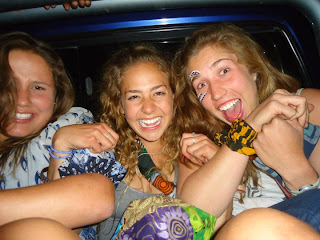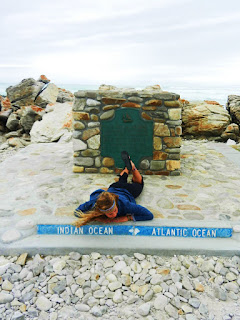I think the pictures from Mozambique look pretty sweet, if I
do say so myself. It looks like some
super tropical hyper colorful African island warm ocean blue ski coconut filled
adventure. And yeah, I suppose it was
that. But the pictures (intentionally,
for the sake of my dear parent’s hearts) left out some of the reality of the
trip. Well, now my wonderful parents and
my beautiful sisters have managed to find their way to Cape Town, and I have
been able to assure them, with reasonable certainty, that I am safe and healthy
(although often lacking in food). And
therefore, because my family and I are now on similar continents, I am able to
tell the REAL story of what happened in Mozambique:
It all began on a rainy day (like most real stories about
Mozambique do) in Johannesburg, South Africa, waiting for the plane to take off
and fly us in to Inhambane, Mozambique.
This is easier said than done in Africa, as someone had stolen the nose
off of our plane (naturally). Now, I
don’t speak from experience, but I feel like nose’s of planes would be heavy,
heavier than a refrigerator even, so I am not sure how this thief was able to
successfully take airplane parts, but he/she managed, causing the flight to be
delayed a good four hours. While in most
cases, a flight delay is nothing more than a hassle, for Gaby and me, it is
more of a safety issue. We had
specifically planned on not having to walk around a strange city when it was
dark, but a few hours into the party on the runway, we realized the sun would
have long been set by the time we would arrive.
But we are fearless, and we are warriors, and we stood in
that line to receive a visa with a confidence that told us that as soon as we
got out of this airport, we would find a cab that would take us straight to the
hostel and no damages would have been done.
But nearing the visa counter, we realized the confidence may have been
premature. A good friend of ours (and
also a travel agent) had said the last time she had been in Mozambique, the
visa’s had cost around R90. (That’s
about 11 dollars for the faithful American crowd.) However, this price had been changed,
slightly, since she had been there, and we were looking at a R700 visa for a
quick stay in Inhambane. Well, that is
not usually the kind of cash folks like us carry around the Johannesburg
airport, so when we got up to the counter, we asked the attendant, as calmly as
possible, if he took credit cards?

He smiled, because we were so cute to ask that, and assured
us that he didn’t take credit cards, but he would take our passports. So he did.
Those precious blue books that anyone who has ever travelled will assure
you that it is the one thing you don’t want to lose/leave behind/ get stolen/
leave with some guy at the two room airport in Mozambique when its night
time. And I’m sure he is usually a
friendly guy, but things just sound friendlier when someone hasn’t taken your identification
from you and tells you to “Come back when you have money.”
Gaby and I were fairly stressed at this point and considered
our options. We could go out on the
streets of the city and try to find and ATM, but that wasn’t sounding too hot
in the dark and rain of a new African city.
We could sell Gaby’s iPod to someone in the airport and then use that
money to get our passports back. We
could trade Gaby’s iPod for our passports with the guy behind the counter. (I
am not sure why my iPod got left out of this.)
Or… we could check everything we have and maybe will come up with the
money. And after thoroughly checking the
pocket of every bag and jacket that we had with us… we had R1420. That was just over the R1400 we needed for
two visas. God is good.
We got our visas, and we received our passports, and
airports like this are too small to have a baggage claim, but they do have a
hall where they will set your bag after you have landed. Still a little bit giddy from not having to
be the next episode of “Locked up Abroad” we skipped to the baggage claim and
the man their kindly told us that that the airlines had left our bags in
Johannesburg, maybe. Mostly he was
trying to reassure that the bags probably hadn’t disappeared completely, and
that maybe they were in South Africa?
And that if they somehow ended up in Mozambique at any point, he would
take them to where we were staying. So I
gave him my South African phone number, fully aware it wouldn’t work in this
country, but at a loss at what else to do.
Anyways, we had bigger problems, like how to get to Tofo, the place
where the hostel was 20km away with just R20 (about 3 dollars).

Things were tense, let’s be real, but me and Gaby put on our
game faces and sweet talked a cab driver into driving around to find ATMs
before we headed to Tofo with our newly found cash. The long awaited ATM stop was fruitless. The bank was closed and the outdoor ATM only
accepted Mozambique cards. We were
officially in the middle of rural African country where we didn’t speak the
language, with no phones, no luggage, no food, no money, and no real idea of
what to do. In the words of one of our
dear African friends, this was Michael Jackson super-bad.
Most of the time, when things go wrong, people have a plan B
in mind. For example, if for some reason
the prospect of graduating college falls through, then I could always fall back
on my new found Contemporary African Dance skills to find a job. Or if class runs late and I can’t make it to
the Mowbray Shoprite before it closes, then I could eat toast for dinner. Again.
However, as me and Gaby stood on that street corner and tried to think of
what plan B could be, nothing really came to mind. We needed money to get to a hostel. We needed money to stay at a hostel. We mostly wanted our moms.
Coming back to the cab driver, with no money and less hope,
we explained the situation. And bless his
heart, the cab driver laughed. And we
drove around. And around. Until we found an ATM that would accept our
South African cards. And while Gaby’s
card still refused to give us any cash, the ATM managed to spit out a little
money (an extremely minimal amount due to South African banking security
policy) and we were officially able to pay the cab driver to take us to the
hostel in Tofo and pay him for driving us about as we tested every ATM in
Inhambane.
That night, I lay in my mosquito net bed and thought several
things. First of all, I thought about Christmas. This could have been due to the fact that
Gaby insisted that our mood would be greatly improved if we listened to The
Polar Express soundtrack before bed.
Second of all, I contemplated, for an extremely long time, why on earth
I was so incredibly happy at that moment in time. I was impossibly hungry, the kind that can
wake you up when your stomach growls. I
was wearing the same yoga pants and t shirt I put on at 4:30 am the morning
prior. I had no money, no plan, and no
way to tell if the noise outside was a warthog or baboon. But I was so impossibly joyful. And only now
can did I figure out why.
Because this was an
adventure. Because I was exploring and I
knew that my heart was free and that I was stretching my wings like they needed
to be stretched. Because I was letting a
restless soul run it all out. And because… well, this is how I knew I was
growing.
Gaby and I, we had more gypsy journeys. We found ourselves hitchhiking around town
and living solely on mangos and coconuts.
Our bags eventually showed up in Inhambane and money was ultimately
obtained. But at this point, it only
barely touched our hearts. What filled us was the realization that we made
friends while we had nothing to offer but our hearts, and the fact that we
laughed just as hard when we were hungry.
I suppose this just confirmed what I had always
suspected. People make me happy and
experiences have me smile. But the
clothes, the money, even the food, it’s not my joy: it’s my comfort. And sometimes you can feel that joy just a little
deeper right there in the middle of uncomfortable.















































